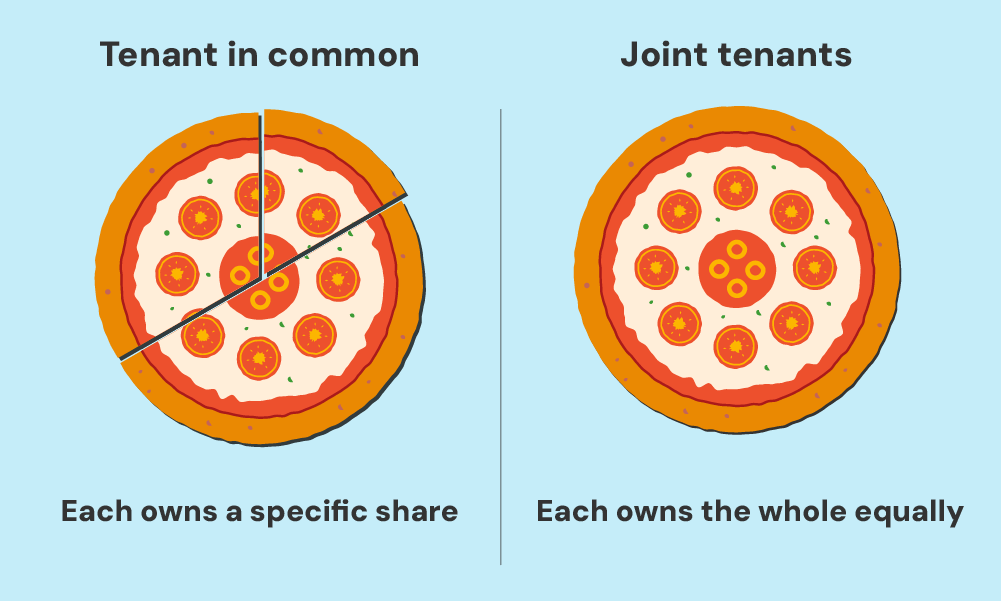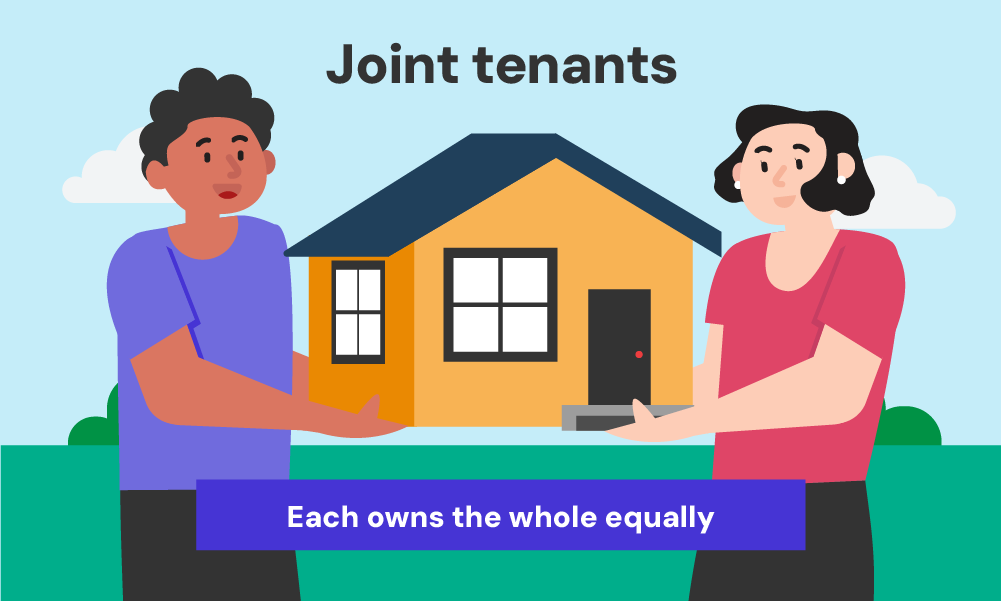How To Change From Tenants in Common to Joint Tenants?

Did you and your partner buy a house together but hold the title as tenants in common?
Perhaps you inherited a property with a sibling and want to solidify your joint ownership.
Regardless of your circumstances, if you’re considering switching from tenants in common to joint tenants, this article is for you.
What’s The Difference Between Tenants in Common And Joint Tenancy?
First, let‘s define the two ways to co-own a property.
Tenants in Common
Each of you owns a specific share that can be equal or different. For example, you might own 75%, and your partner owns 25%, or any other percentage.
In this setup, you can freely sell or give away your share without needing permission.
If you pass away, your part of the property goes to your heirs or according to your will, not automatically to the other owners.
Joint Tenancy
Here, everyone owns the property equally. This means, that if there are four of you, each owns 25%.
What’s special about this is if one owner dies, their share automatically goes to the surviving owners.
This happens right away and doesn’t go through a will. If you try to sell your share, this can change the ownership to Tenants in Common
In short, the big difference is what happens when an owner dies.
As tenants in common, you each own a DISTINCT share of the property that you can sell or leave in your will.
As joint tenants, you are considered ONE legal owner – you both equally own 100% of the home.

Why Would You Want To Switch To Joint Tenancy?
There are several key reasons why you may want to change from being tenants in common to joint tenants:
- You got married and now want the benefits of owning your home together as one family unit.
- You previously bought with friends/family but your circumstances have changed.
- You are in a long-term relationship and want to solidify your shared ownership.
- You inherited a property as tenants in common and prefer joint tenancy.
How Do I Legally Change To Joint Tenants?
If you decide to become joint tenants, there is an official process to go through. Here are the key steps:
1. Get Legal Advice. Start by consulting a solicitor or conveyancer specialising in property law. They’ll explain what changing ownership means and guide you through the process.
2. Ensure everyone agrees. All current co-owners must agree to switch from tenants in common to joint tenants. To do this, you’ll need to formally notify the other co-owners in writing for clarity and legal protection.
3. Draft a Deed or Declaration of Trust. Your solicitor will likely draft a document called a deed or declaration of trust. This document states that everyone agrees to own the property jointly, giving up their individual shares for equal ownership.
4. Complete Land Registry Forms. You’ll need to fill out specific forms and submit them to the Land Registry:
- Cancel a Restriction (RX3) form – This removes any existing restrictions from your tenancy in common.
- A statutory declaration prepared by a conveyancer or a ‘statement of truth’ using the ST5 form.
5. Submit to the Land Registry. Send the completed forms, along with the new trust deed and any other required documents, to the Land Registry for processing. There might be a fee involved.
6. Get Confirmation. Once processed, the Land Registry will update their records to reflect your new joint tenancy status. You’ll receive confirmation of this change.
7. Tax Considerations (if applicable). If the property generates income (like rentals), you may need to inform HM Revenue and Customs (HMRC) about the ownership change. This could impact your tax situation, especially if the owners are married or in a civil partnership.
>> More about the required legal process here.
Are There Any Risks in Becoming Joint Tenants?
Yes, becoming joint tenants comes with some risks.
Firstly, you lose the ability to sell or mortgage your share of the property without everyone else’s agreement.
Secondly, the right of survivorship means the surviving tenant(s) automatically inherits the entire property when someone dies. This can be useful, but it might cause problems if the joint tenants have different families or if their relationships change.
Disagreements can also arise, as all decisions about the property must be unanimous. This can lead to deadlocks and make it difficult to manage or sell the property without going to court.
If one joint tenant has financial trouble, creditors could seize the entire property, even if the other tenants aren’t in debt.
Adding someone as a joint tenant might also trigger stamp duty or other taxes, depending on where you live. It can also affect your inheritance tax planning.
Think of it this way: as joint tenants, you’re ONE legal owner. So, if one of you has debts, creditors could come after the whole property, not just your individual share.
An image to represent that as joint tenants, both co-owners share equal responsibility in property rights, debts, and taxes.

How About From Joint Tenants to Tenants in Common?
It’s also possible to switch from being joint tenants back to tenants in common if your circumstances change again.
Reasons to do this include:
- Relationship breakdown/separation
- Wanting to leave your share to specific beneficiaries
- Protecting your share from a partner’s long-term care fees
The process involves serving formal legal notices and may require paying capital gains tax.
The Bottom Line
Before making the switch, consider your situation.😀
While changing from tenants in common to joint tenants solidifies your shared equal ownership, it also means losing your distinct share.
For expert guidance, consult a mortgage broker. They’ll navigate the legal complexities, ensure a smooth transition, and protect your interests regarding potential financial or tax implications.
To get started, contact us today. We’ll connect you with a qualified broker to help you make informed decisions and the process seamless.
Get Matched With Your Dream Mortgage Advisor...

Frequently asked questions
What are the rights of joint tenants in the UK?
Joint tenants in the UK have equal rights to the entire property, and each tenant’s share automatically passes to the other tenants upon their death, due to the right of survivorship.
What happens when one of the tenants in common dies in the UK?
When one of the tenants in common dies in the UK, their share of the property does not automatically pass to the surviving owners. Instead, it goes to their heirs or is distributed according to their will.
How do I know if I have joint tenants or ‘tenants in common’?
You can check the property’s title deed to see if it states that the property is held as joint tenants or tenants in common. If it’s not clear, you may need to consult with a solicitor.
Which is better, joint tenants or tenants in common?
The choice between joint tenants and tenants in common depends on your circumstances.
Joint tenancy is usually preferred by couples who want the property to pass easily to the survivor. ‘Tenants in common’ is better if you want to leave your share of the property to someone other than the co-owners, like your children from a previous relationship.
This article has been fact checked
This article was created, checked, and verified by the expert team at Money Saving Guru. Trust us, you’re in good hands.




